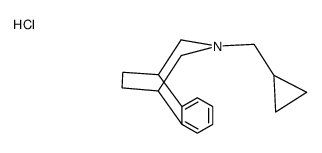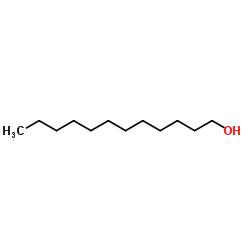7617-74-5
| 中文名 | 3-十二烷氧基丙胺 |
|---|---|
| 英文名 | 3-Lauryloxypropyl-1-amine |
| 中文别名 |
劳立沙明
3-(十二烷氧基)丙氨 十二烷氧基丙胺 |
| 英文别名 |
3-(dodecyloxy)propan-1-amine
3-(Dodecyloxy)-1-propanamine Laurixamine 3-Lauryloxypropylamine 3-Dodecyloxy-1-propanamine Laurixamine [INN] 3-dodecoxypropan-1-amine EINECS 231-528-1 3-Dodecyloxypropanamine MFCD00025621 |
| 密度 | 0.9±0.1 g/cm3 |
|---|---|
| 沸点 | 336.2±15.0 °C at 760 mmHg |
| 熔点 | 13 °C |
| 分子式 | C15H33NO |
| 分子量 | 243.429 |
| 闪点 | 133.7±9.2 °C |
| 精确质量 | 243.256210 |
| PSA | 35.25000 |
| LogP | 5.41 |
| 蒸汽压 | 0.0±0.7 mmHg at 25°C |
| 折射率 | 1.449 |
| 储存条件 | 密封于阴凉干燥环境。 |
| 稳定性 | 如果遵照规格使用和储存则不会分解。 |
| 水溶解性 | <0.1 G/L (20 ºC) |
| 分子结构 | 1、 摩尔折射率:76.82 2、 摩尔体积(m3/mol):286.1 3、 等张比容(90.2K):677.6 4、 表面张力(dyne/cm):31.4 5、 极化率(10-24cm3):30.45 |
| 计算化学 | 1.疏水参数计算参考值(XlogP):5.1 2.氢键供体数量:1 3.氢键受体数量:2 4.可旋转化学键数量:14 5.互变异构体数量:无 6.拓扑分子极性表面积35.2 7.重原子数量:17 8.表面电荷:0 9.复杂度:128 10.同位素原子数量:0 11.确定原子立构中心数量:0 12.不确定原子立构中心数量:0 13.确定化学键立构中心数量:0 14.不确定化学键立构中心数量:0 15.共价键单元数量:1 |
| 更多 | 1. 性状:淡黄色液体 2. 密度(g/mL,25/4℃): 0.845 3. 相对蒸汽密度(g/mL,空气=1):无可用 4. 熔点(ºC):13 5. 沸点(ºC,常压):315 6. 沸点(ºC,5.2kPa): 无可用 7. 折射率: 1.4455-1.4485 8. 闪点(ºC): 165 9. 比旋光度(º):无可用 10. 自燃点或引燃温度(ºC):无可用 11. 蒸气压(kPa,25ºC):无可用 12. 饱和蒸气压(kPa,60ºC):无可用 13. 燃烧热(KJ/mol):无可用 14. 临界温度(ºC):无可用 15. 临界压力(KPa):无可用 16. 油水(辛醇/水)分配系数的对数值:无可用 17. 爆炸上限(%,V/V):无可用 18. 爆炸下限(%,V/V): 无可用 19. 溶解性:微溶于水 |
Synonym:3-n-Dodecyloxy-1-aminopropane; 1-Propanamine, 3-(dodecyloxy)-; 3-Dodecyloxypropanamin Section 2 - COMPOSITION, INFORMATION ON INGREDIENTS
Risk Phrases: 22 34 Section 3 - HAZARDS IDENTIFICATION EMERGENCY OVERVIEW
Harmful if swallowed. Causes burns.Corrosive. Potential Health Effects Eye: Causes eye burns. May cause chemical conjunctivitis and corneal damage. Skin: Causes skin burns. May cause skin rash (in milder cases), and cold and clammy skin with cyanosis or pale color. Ingestion: May cause severe and permanent damage to the digestive tract. Causes gastrointestinal tract burns. May cause perforation of the digestive tract. May cause central nervous system depression. May cause systemic effects. Inhalation: May cause severe irritation of the respiratory tract with sore throat, coughing, shortness of breath and delayed lung edema. Causes chemical burns to the respiratory tract. Exposure produces central nervous system depression. Aspiration may lead to pulmonary edema. May cause systemic effects. Chronic: Effects may be delayed. Section 4 - FIRST AID MEASURES Eyes: Immediately flush eyes with plenty of water for at least 15 minutes, occasionally lifting the upper and lower eyelids. Get medical aid immediately. Do NOT allow victim to rub eyes or keep eyes closed. Extensive irrigation with water is required (at least 30 minutes). Skin: Get medical aid immediately. Immediately flush skin with plenty of water for at least 15 minutes while removing contaminated clothing and shoes. Wash clothing before reuse. Destroy contaminated shoes. Ingestion: Never give anything by mouth to an unconscious person. Get medical aid immediately. Do NOT induce vomiting. If conscious and alert, rinse mouth and drink 2-4 cupfuls of milk or water. Inhalation: Get medical aid immediately. Remove from exposure and move to fresh air immediately. If breathing is difficult, give oxygen. Do not use mouth-to-mouth resuscitation if victim ingested or inhaled the substance; induce artificial respiration with the aid of a pocket mask equipped with a one-way valve or other proper respiratory medical device. Notes to Physician: Section 5 - FIRE FIGHTING MEASURES General Information: As in any fire, wear a self-contained breathing apparatus in pressure-demand, MSHA/NIOSH (approved or equivalent), and full protective gear. During a fire, irritating and highly toxic gases may be generated by thermal decomposition or combustion. Extinguishing Media: This material is lighter than water and insoluble in water. The fire could easily be spread by the use of water in an area where the water cannot be contained. Use water spray, dry chemical, carbon dioxide, or appropriate foam. Section 6 - ACCIDENTAL RELEASE MEASURES General Information: Use proper personal protective equipment as indicated in Section 8. Spills/Leaks: Absorb spill with inert material (e.g. vermiculite, sand or earth), then place in suitable container. Clean up spills immediately, observing precautions in the Protective Equipment section. Provide ventilation. Section 7 - HANDLING and STORAGE Handling: Wash thoroughly after handling. Remove contaminated clothing and wash before reuse. Do not get in eyes, on skin, or on clothing. Keep container tightly closed. Do not ingest or inhale. Use only in a chemical fume hood. Discard contaminated shoes. Storage: Store in a tightly closed container. Corrosives area. Store in a cool, dry area away from incompatible substances. Section 8 - EXPOSURE CONTROLS, PERSONAL PROTECTION Engineering Controls: Facilities storing or utilizing this material should be equipped with an eyewash facility and a safety shower. Use adequate ventilation to keep airborne concentrations low. Exposure Limits CAS# 7617-74-5: Personal Protective Equipment Eyes: Wear appropriate protective eyeglasses or chemical safety goggles as described by OSHA's eye and face protection regulations in 29 CFR 1910.133 or European Standard EN166. Skin: Wear appropriate protective gloves to prevent skin exposure. Clothing: Wear appropriate protective clothing to prevent skin exposure. Respirators: A respiratory protection program that meets OSHA's 29 CFR 1910.134 and ANSI Z88.2 requirements or European Standard EN 149 must be followed whenever workplace conditions warrant respirator use. Section 9 - PHYSICAL AND CHEMICAL PROPERTIES Physical State: Clear liquid Color: clear, colorless Odor: None reported. pH: Not available. Vapor Pressure: <1 mbar @ 20 C Viscosity: 6.9 MPA 20.00 deg C Boiling Point: 315 deg C @ 760.00mm Hg Freezing/Melting Point: 13 deg C Autoignition Temperature: 270 deg C ( 518.00 deg F) Flash Point: 165 deg C ( 329.00 deg F) Explosion Limits, lower: Not available. Explosion Limits, upper: Not available. Decomposition Temperature: Not available. Solubility in water: <0.1 g/l (20 c) Specific Gravity/Density: .8450g/cm3 Molecular Formula: C15H33ON Molecular Weight: 243.43 Section 10 - STABILITY AND REACTIVITY Chemical Stability: Stable under normal temperatures and pressures. Conditions to Avoid: Incompatible materials, excess heat. Incompatibilities with Other Materials: No information found.. Hazardous Decomposition Products: Carbon monoxide, irritating and toxic fumes and gases, carbon dioxide. Hazardous Polymerization: Has not been reported. Section 11 - TOXICOLOGICAL INFORMATION RTECS#: CAS# 7617-74-5 unlisted. LD50/LC50: Not available. Carcinogenicity: 3-Lauryloxypropyl-1-amine - Not listed by ACGIH, IARC, or NTP. Section 12 - ECOLOGICAL INFORMATION Section 13 - DISPOSAL CONSIDERATIONS Dispose of in a manner consistent with federal, state, and local regulations. Section 14 - TRANSPORT INFORMATION IATA Shipping Name: CORROSIVE LIQUID, BASIC, ORGANIC, N.O.S* Hazard Class: 8 UN Number: 3267 Packing Group: III IMO Shipping Name: CORROSIVE LIQUID, BASIC, ORGANIC, N.O.S. Hazard Class: 8 UN Number: 3267 Packing Group: III RID/ADR Shipping Name: CORROSIVE LIQUID, BASIC, ORGANIC, N.O.S. Hazard Class: 8 UN Number: 3267 Packing group: III Section 15 - REGULATORY INFORMATION European/International Regulations European Labeling in Accordance with EC Directives Hazard Symbols: C Risk Phrases: R 22 Harmful if swallowed. R 34 Causes burns. Safety Phrases: S 26 In case of contact with eyes, rinse immediately with plenty of water and seek medical advice. S 28A After contact with skin, wash immediately with plenty of water. WGK (Water Danger/Protection) CAS# 7617-74-5: 2 Canada CAS# 7617-74-5 is listed on Canada's NDSL List. CAS# 7617-74-5 is not listed on Canada's Ingredient Disclosure List. US FEDERAL TSCA CAS# 7617-74-5 is listed on the TSCA inventory. SECTION 16 - ADDITIONAL INFORMATION N/A |
|
生态学数据: 通常对水是不危害的,若无政府许可,勿将材料排入周围环境。
|
| 危害码 (欧洲) | C:Corrosive |
|---|---|
| 风险声明 (欧洲) | R22;R34 |
| 安全声明 (欧洲) | S45-S37/39-S26 |
| 危险品运输编码 | 2735 |
| 包装等级 | II |
| 危险类别 | 8 |
| 海关编码 | 2922199090 |
| 上游产品 4 | |
|---|---|
| 下游产品 2 | |
| 海关编码 | 2922199090 |
|---|---|
| 中文概述 | 2922199090. 其他氨基醇及其醚,酯和它们的盐(但含一种以上含氧基的除外). 增值税率:17.0%. 退税率:13.0%. 监管条件:无. 最惠国关税:6.5%. 普通关税:30.0% |
| 申报要素 | 品名, 成分含量, 用途, 乙醇胺及其盐应报明色度, 乙醇胺及其盐应报明包装 |
| Summary | 2922199090. other amino-alcohols, other than those containing more than one kind of oxygen function, their ethers and esters; salts thereof. VAT:17.0%. Tax rebate rate:13.0%. . MFN tariff:6.5%. General tariff:30.0% |









